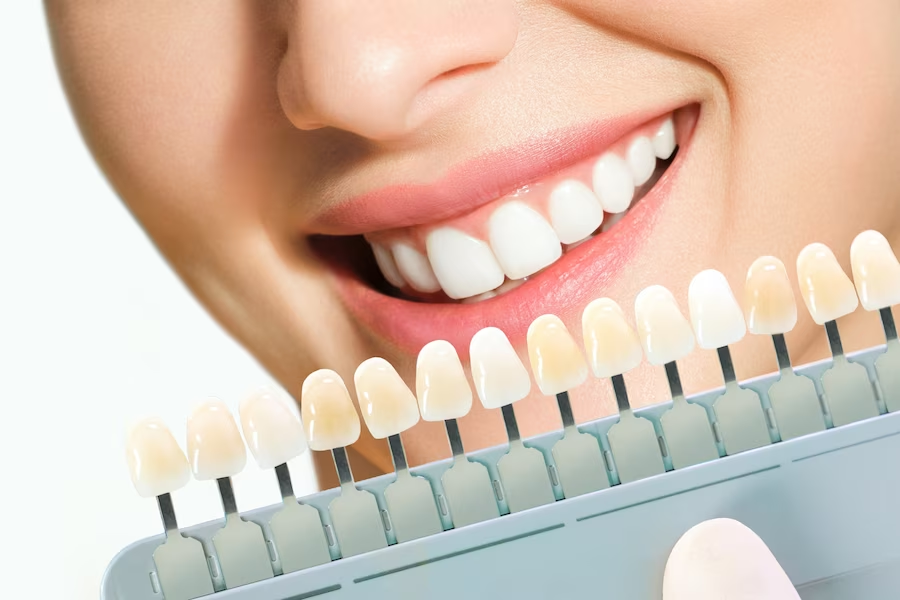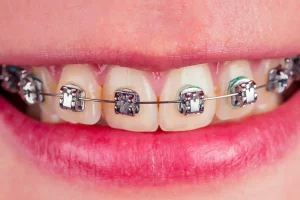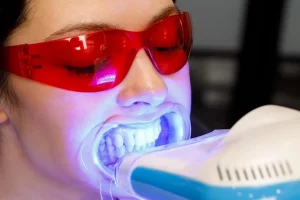Veneers are a standard cosmetic dental treatment that can significantly improve the appearance of one’s smile. Veneers are a long-term option for creating a gorgeous smile. If you’re thinking about having veneers, you may be wondering how long they’ll last and what you can do to extend their life. In this article, we will look at veneers, their different varieties, and the elements that influence their lifespan, as well as some ideas on how to keep them as long as possible. So, let’s find out how long veneers can last!
What are dental veneers?
Veneers are thin layers of porcelain or composite filling material adhered to tooth enamel. They are applied on the front surface of the teeth to improve their appearance.
They are used to treat issues like discoloration, chipping, and inconsistencies, resulting in a natural-looking cosmetic improvement. Veneers are custom-made, require a multi-step process, and can last a decade or more with good maintenance.
Benefits of Veneers:
Here are the benefits of dental veneers.
Cosmetic Enhancement: Veneers can improve the appearance of teeth by hiding stains, discoloration, chipping, and gaps.
Natural Appearance: They offer a natural-looking alternative for achieving a stunning smile.
Durable: Porcelain veneers are stain-resistant and can last a decade or more with proper maintenance.
Minimally Invasive: The process is less intrusive than other dental treatments like crowns.
Customizable: Veneers are custom-made to match the color, shape, and size of the patient’s natural teeth, ensuring a flawless fit.
Quick Results: Patients can have their smiles transformed in just a few dentist visits.
Types of veneers:
There are two primary types of dental veneers: porcelain veneers and composite veneers. Here’s a quick summary of each:
Porcelain Veneers:
Porcelain veneers are thin, customized shells made of porcelain. They are noted for their natural appearance, durability, and resistance to stains.
Material: Made of thin ceramic shells.
Durability: Extremely durable and stain-resistant.
Appearance: Create a natural look of teeth with a translucent quality.
Application: Requires extra preparation, which typically includes removing a tiny bit of enamel.
Longevity: With careful care, they can last for 10 to 15 years or longer.
Composite Veneers:
Composite veneers consist of several thin layers. Composite resin is placed on the front surface of teeth to improve their aesthetic appearance. These veneers are fashioned freehand straight onto the teeth, providing faster and more inexpensive options.
Material: Made of tooth-colored composite resin.
Durability: Less durable than porcelain, but still lasts a long time.
Appearance: A little less translucent than porcelain, but still natural-looking.
Application: In most cases, minimal tooth preparation is required, and the veneers can be applied in one visit.
Longevity: Typically has lower longevity than porcelain, lasting 5 to 7 years.
Both types of veneers have their benefits and drawbacks. The decision between them is determined by criteria such as financial matters, aesthetic goals, and the dentist’s recommendation based on the patient’s dental requirements.
Here., at Oris Dental Center, we offer various types of veneer treatments like the ones below.
Lumineers Veneers
Lumineers is a brand of ultra-thin porcelain veneers that are reversible and require minimal tooth preparation. They’re often referred to as “no-prep” veneers. They are intended to give a natural and long-lasting cosmetic solution for improving the appearance of teeth with minimal change to the original tooth structure. Lumineers are custom-made and usually require fewer dentist visits than standard veneers.
KATANA Zirconia
KATANA Zirconia is a high-quality dental material suitable for veneers. It is a zirconium oxide ceramic renowned for its strength, durability, and natural appearance. KATANA Zirconia veneers are designed to match the color and shape of natural teeth, making them a long-lasting and visually acceptable option for cosmetic dental treatments.
How long do veneers last?
Veneers typically endure from 10 to 15 years. Oral hygiene, habits, and the type of material used all have a substantial impact on their lifespan. With adequate care and maintenance, some people can have veneers endure for 20 years or longer. Here’s some info on the various veneers and their lifetime
Porcelain veneers: On average, it can last around 10 to 15 years
Composite Veneers: On average, composite veneers typically last around 5 to 10 years.
Lumineers Veneers: These last around 10 to 15 years or more with proper care and maintenance.
KATANA Zirconia: It can last 15 years or more
Regular dental check-ups and avoiding damaging behaviors might help veneers last longer. Veneers will eventually need to be replaced due to wear and tear. Thus, it is critical to follow your dentist’s care instructions.
How do you care for the veneers?
Veneers require proper care to ensure their life and look. Below are some general suggestions for caring for your veneers:
Good Oral Hygiene:
- Brush your teeth at least twice every day using non-abrasive toothpaste.
- Floss daily to keep your teeth and veneers clean.
- Use a soft-bristled toothbrush to avoid scratching or harming the veneers.
Staining Substances:
- Limit your intake of foods and beverages that might stain teeth, such as coffee, tea, red wine, and smoke.
- If you ingest these items, use a straw to avoid contact with your veneers.
Protect Your Teeth:
- Avoid biting on hard items or opening packages with your teeth, as this can damage the veneers.
- If you participate in sports, consider wearing a mouthguard to protect your teeth and veneers from any damage.
Teeth Grinding:
- If you have a habit of grinding or clenching your teeth, talk to your dentist. They may recommend a night guard to keep your veneers safe while you sleep.
Maintain a Balanced Diet:
- A well-balanced, full-of-nutrient diet improves overall dental health.
Alcohol-Based Mouthwashes:
- Some mouthwashes contain alcohol, which might impair veneer bonds. Consult your dentist for appropriate mouthwash advice.
Follow the Dentist’s Instructions:
- Adhere to any specific care instructions provided by your dentist. They may offer personalized advice based on your oral health and the type of veneers you have.
If you ever experience any issues with your veneers or notice changes in their appearance, contact your dentist promptly.
Conclusion:
In conclusion, the longevity of veneers depends on various factors such as the material used, individual oral hygiene practices, and lifestyle habits. On average, veneers can last between 10 to 15 years or more. Proper care, including regular dental check-ups and good oral hygiene that can protect veneers, which is essential to maximize their lifespan. At Oris Dental Center, our team is dedicated to providing personalized care and guidance to ensure the longevity and optimal performance of your veneers. Don’t hesitate to discuss your expected lifespan and care guidelines with us to maintain a healthy and beautiful smile for years to come.





